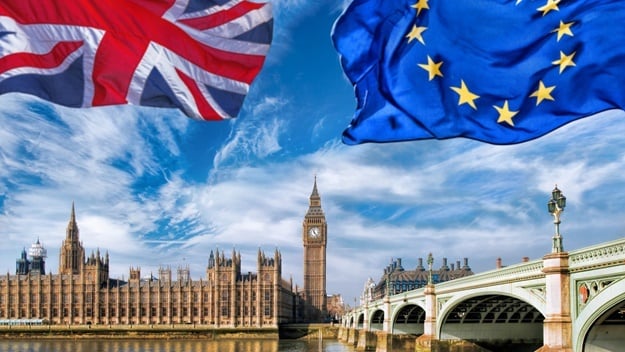
Negotiations between the UK and European Union over a post-Brexit trade deal will resume on Sunday, as both sides try to salvage an accord following a crisis call between their respective leaders.
With a deal hanging in the balance, here’s a summary of what’s at stake if the talks fail.
If no agreement is reached, it would be a hammer blow for businesses and consumers on both sides. Decades of free movement of goods, services, people and capital would come to an abrupt end when Britain leaves the EU’s single market and customs union on December 31.
Companies would face tariffs, quotas and potential chaos as they move goods across the border, finance firms in the City of London would lose their passport to offer services across the EU, and consumers would see their rights to live and stay on the other side of the English Channel curtailed.
Even taking a pet dog to the continent would become more difficult.
The Economic Hit
Without a trade deal, the UK economy would suffer a near-term shock of around 1.5% of GDP, according to Bloomberg Economics. The Office for Budget Responsibility, Britain’s independent spending watchdog, forecasts a 2% GDP decline.
Instead of frictionless trade with a market of more than 400 million consumers, British firms would revert to trading with the EU under rules established by the World Trade Organization in 1995. That means imports and exports to the EU would be subject to WTO-negotiated tariffs -- essentially a tax on goods.
The EU’s average tariff rate is 3%, but some products would attract much higher levies: British automakers would face a 10% tariff on all auto exports to the EU, while farmers exporting dairy products would see a 35.4% charge.
The car industry alone would face a 55 billion-pound hit due to a collapse in demand and local production due to tariffs, according to the Society of Motor Manufacturers and Traders.
Tariffs could also lead to increased prices for companies and consumers. For supermarkets, the cost would be 3.1 billion pounds ($4 billion) a year, according to the British Retail Consortium. Some 85% of foods imported from the EU would attract tariffs of 5% or more.
About 43% of the UK’s exports, valued at about 300 billion pounds, go to the EU each year, and the bloc is the source of 51% of its imports.
City of London
Finance firms will lose their passport to offer services across the EU, whether there’s a trade deal or not, forcing them to shift staff and beef-up their operations in the bloc.
Their access to customers would depend on the EU judging UK rules to be equivalent to its own in 40 areas. Failure to reach a trade accord would set back that process. Even if permission is granted, the EU would still be able to withdraw it with little notice.
Customs
Businesses exporting to the EU will have to file customs declarations with or without a trade deal. To move goods from Dover to Calais -- the UK’s busiest crossing point with the EU -- trucks will need a government-issued permit indicating they have the correct paperwork and won’t be held up by French officials.
Delays at the border would threaten to throw manufacturers relying on parts arriving just-in-time into chaos, including companies in car-making and aerospace, while fresh food produce might rot in queuing trucks.
Passports
Even with a trade deal, British visitors to the EU will need more than six months left on their passport in order to travel. Those staying in the EU for longer than 90 days may require a visa.
Motorists may need an international driving permit. Traveling with pets to the EU will become more difficult, too. Animal owners will face a four-month process involving blood tests, vaccinations and health certificates.
Immigration
The free movement of people between Britain and the EU will end. The UK is planning to use a so-called points-based immigration system, where overseas workers must prove they meet certain criteria before being allowed to come to Britain for a job.
The criteria include speaking English, having an existing employment offer and earning more than 20,480 pounds a year.